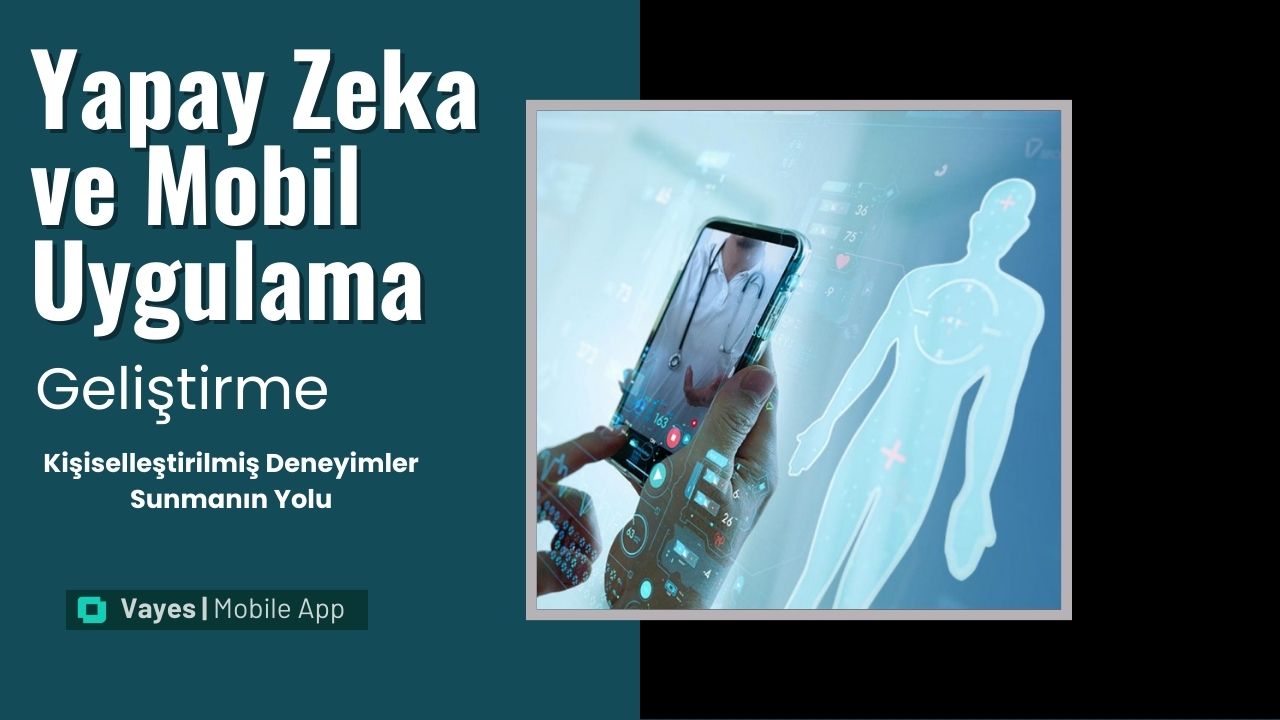Hello,
How Can We Help You?
Contact Form
Fill out the form and we will contact you as quickly as possible.
|

In today’s digital world, mobile apps play a significant role in users’ lives. Users now expect more than standard solutions; they seek personalized experiences. This is where artificial intelligence redefines mobile app development. As of 2025, artificial intelligence and mobile app development have become one of the most effective ways to deliver personalized experiences. Businesses enhance loyalty and gain a competitive edge by offering tailored solutions to users’ needs. Artificial intelligence enables a user-centric approach in this process, making mobile apps more meaningful.
Artificial intelligence takes personalization in mobile apps to the next level. It analyzes user data to provide experiences tailored to each individual. For example, machine learning algorithms learn users’ preferences and habits to suggest relevant content. This helps apps build stronger connections with users.
Traditional development methods typically produce solutions aimed at a broad audience. However, artificial intelligence shifts this approach by focusing on individual needs. In a shopping app, AI can offer personalized discounts based on a user’s past purchases. Such personalization encourages users to engage with the app more often and increases their satisfaction. Artificial intelligence also continuously improves the experience with real-time analysis.
Artificial intelligence shapes personalization trends in mobile app development in 2025. These trends meet users’ demands while opening new opportunities for developers. Here are some key trends of this year:
These trends highlight the impact of artificial intelligence on personalization. Users expect apps to offer solutions tailored to them. Artificial intelligence makes development processes more flexible and innovative to meet these expectations. In a fitness app, AI can create workout plans based on a user’s exercise history. Such features boost users’ loyalty to the app.

Artificial intelligence offers numerous advantages in mobile app development. Developers can analyze user data to create more targeted solutions. This speeds up the development process and enhances user experience. Artificial intelligence automates complex tasks, saving time and reducing costs.
Personalization stands out as one of the biggest benefits provided by AI. For example, in a music app, artificial intelligence can curate personalized playlists based on a user’s listening habits. This makes the app feel more personal and valuable to users. Artificial intelligence also improves app performance by detecting errors. In an e-commerce app, AI can analyze which products users are interested in to optimize inventory management.
Development processes become more efficient with artificial intelligence. Developers can quickly assess user feedback and keep apps updated. In a travel app, AI can offer personalized vacation packages based on users’ travel preferences. This enriches the user experience and boosts business revenue.
Artificial intelligence transforms mobile app development to deliver personalized experiences across various industries. Here are some industry examples:
E-commerce: E-commerce apps use artificial intelligence and mobile app development to offer tailored shopping experiences. Personalized recommendations are made based on users’ past data. In a fashion app, AI suggests clothing items matching a user’s style, simplifying shopping.
Healthcare: Healthcare apps leverage artificial intelligence to analyze users’ health data and provide customized solutions. For instance, a diet app can create personalized meal plans based on a user’s eating habits. Integration with voice assistants makes health tracking easier for users.
Education: Educational apps personalize the learning experience with artificial intelligence. In a math app, AI identifies a user’s weak areas and offers tailored exercises. This makes learning more effective.
Entertainment: Entertainment apps recommend content based on users’ interests using AI. In a video platform, artificial intelligence suggests movies based on viewing history, ensuring an enjoyable experience.
Artificial intelligence and mobile app development will advance personalization even further in the future. New technologies will make apps smarter and more user-focused. For example, 5G technology will enable real-time personalization. Users will expect apps to adapt to their needs instantly.
Artificial intelligence equipped with emotional intelligence will deliver experiences based on users’ emotional states. In a meditation app, AI could analyze a user’s stress level and suggest personalized relaxation techniques. This will make a notable difference, especially in health and wellness apps. Developers will use artificial intelligence for deeper analysis to enhance personalization strategies.
In the future, artificial intelligence could offer fully autonomous development processes. For instance, a business might specify basic goals, and AI could build a personalized mobile app. This will accelerate development and increase user interaction with apps.
Artificial intelligence holds significant potential for delivering personalized experiences but comes with some challenges. Data privacy emerges as a primary concern. Analyzing user data can increase security risks. This requires developers to implement stricter security measures.
Training artificial intelligence models demands large amounts of data and resources. For small-scale teams, this can pose a barrier. Accessing and processing large datasets is a costly process. Incorrect predictions by AI also carry risks. For example, an app might misinterpret a user’s interests and offer irrelevant suggestions.
Over-reliance on artificial intelligence in personalization could make experiences uniform. Completely removing the human element might jeopardize an app’s uniqueness. Developers should use AI as a tool while incorporating their own creativity. This balance keeps personalized experiences both innovative and authentic.
Artificial intelligence and mobile app development shape the future of delivering personalized experiences. These innovations simplify users’ lives and enhance the value of mobile apps. In the future, AI’s impact in this field will grow stronger, creating richer experiences for users.
Contact Form
Fill out the form and we will contact you as quickly as possible.
 Notification Center 00:00
Notification Center 00:00